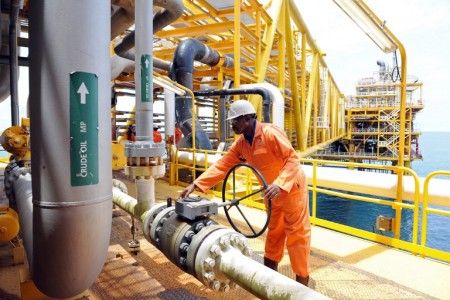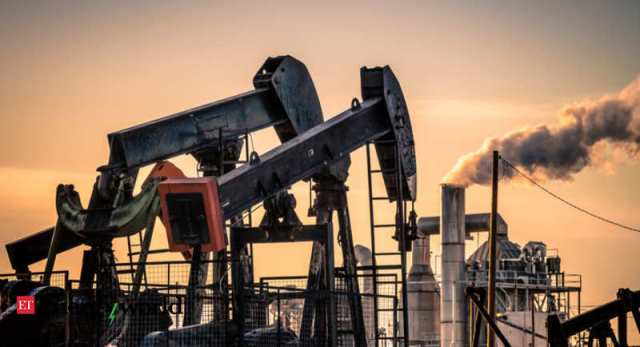
Fishing boats look like specks alongside Egina, which has been moored for the last month in Lagos. Even the container ships that usually dominate the port look like small boats.
According to AFP, the floating production storage and offloading facility (FPSO), developed by the French group, Total, looks a lot like a giant Lego set.
Everything about it is gigantic: its weight (220,000 tons), length (330 metres/1,083 feet) and width (60 metres). At 33 metres, it’s as high as a 10-storey building.
The vessel is in its last stage of construction and will soon produce some 200,000 barrels of oil a day or about 10 percent of national production.
In the next few months, Egina will head to the Niger Delta and link up to 44 subsea wells some 1,600 metres under the Gulf of Guinea.
Up to 2.3 million barrels of crude can be stored in its hull, before being taken abroad to be refined.
The cost of the project is up to $16 billion. However, according to the head of Total in Nigeria, Nicolas Terraz, the investment is justified.
“Nigeria is a very important country for Total. We’ve been here for the last 60 years,” he told AFP, looking up at the huge ship.
“It’s the biggest FPSO ever constructed by the group.”
The construction of Egina in Africa for Africa may be a first but it’s not been welcomed by everyone in Lagos. Residents say it disturbs their sleep while the Egina’s sheer size has made it difficult for the yachts of amateur sailors to catch the wind in their sails.
It’s not just Egina’s size and cost that is unique: it’s the first major project to have been undertaken since a 2010 Nigerian law that made “local content” mandatory.
More than half of those involved in its construction were Nigerian and more than 75 percent of the work was done in Port Harcourt or Lagos. The remainder was done at the Samsung shipyard in South Korea.
“We would have never thought that these things could be done locally,” said Dolapo Oni, an oil analyst with Ecobank. “It was a big gamble for Total.”
“Local companies have no access to local banks or even international funding.
“But Egina shows that there is still foreign confidence at a time when Shell or Exxon don’t invest anymore in Nigeria.”
Nigeria has suffered years of mismanagement of its resources.
In January, the National Assembly voted for a bill to reform the oil sector and make it more transparent. Buhari, who also doubles up as oil minister, has vowed to overhaul the sector as part of his drive to end corruption.
In Lagos, the fishermen who pass by the Egina every day in their grimy boats can make as little as two dollars a day. It’s a sign of the vast inequality in Lagos. But private local partners see a chance for change: 3,000 people have already been involved in the Lagos construction phase of Egina.
Ladol, which provides support services to the oil and gas sector and where Egina has been is 100 percent Nigerian. Its chief executive, Amy Jadesimi, said the vessel’s arrival radically changed the landscape of the industry.
“We now have the biggest crane capacity in the whole of Africa, we have a qualified labour force,” said the 42-year-old former investment banker in London. The idea is to host more projects like this one and not the largest vessels in the world, they can come and collect the largest amount of domestic products.” He estimated that could generate up to 50,000 jobs.
On the road leading to the port, lorry drivers wait for weeks on end in searing heat just to be able to unload or take delivery of only in oil and gas. We can fabricate very large silos for agricultural products and now that we can host their cargo.
It is important for the Federal Government to invest in energy and infrastructure to experience the desired growth in the sector since it gets 70 percent of its revenue from oil.












